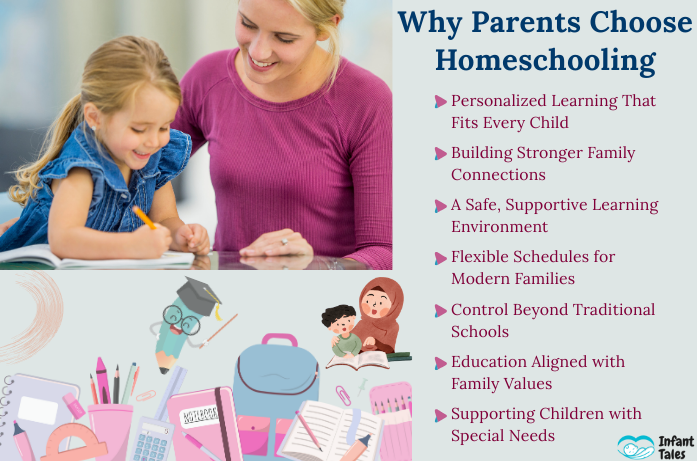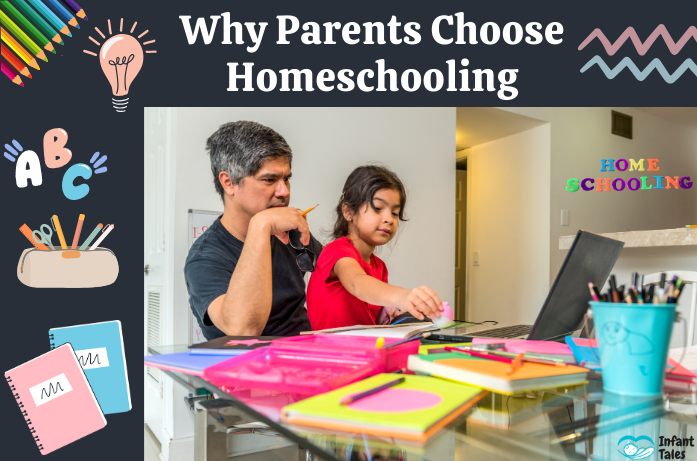By Infant Tales Team
From a niche educational method, homeschooling has now become a mainstream topic among families around the world. Once unpopular, a growing number of parents are now asking: Is homeschooling good for my child?
On this journey of discovery, as a caring mother, I’ve come to realize that homeschooling is about more than just textbooks and lesson plans; it’s about values, priorities, and a desire to give your children the best start possible. Here we’ll explore why parents choose homeschooling, what some of its advantages and disadvantages homeschooling are, and when it might be right for them to move their children to school.
The Rise of Homeschooling
Over the past few decades, homeschooling has skyrocketed around the world with ups and downs. According to the National Center for Education Statistics (NCES) in the United States, homeschooling rates have nearly doubled since the early 2000s. This sudden increase revealed itself during the pandemic. Families were forced to study from home, and while most people returned to traditional schooling, some found hidden benefits to homeschooling and decided to continue.
Homeschooling today is not just about academics, it reflects broader shifts in how parents see education and childhood. Families want more control, more personalization, and more say in how their children learn.

Why Parents Choose Homeschooling
Every family’s story is different, but there are common reasons parents choose homeschooling.
1. Personalized Learning for Every Child
Kids learn best in their own unique ways. Some individuals may thrive on visuals and others on activities. Teachers in the traditional scenario cannot possibly tailor their teachings to every student’s style because of large class size and rigid curricula.
Homeschooling lets parents decide how to teach their children:
- Charts, diagrams, and documentaries can be utilized for visual learners.
- Active learners must combine movement with lessons and real-world applications.
- Some gifted kids move very fast, while others take their time.
This flexibility usually culminates into a deeper understanding and a greater appreciation of learning.American Psychological Association (APA) research supports the value of adapting teaching to children’s learning styles.
2. Stronger Family Bonds
Homeschooling, by its very nature, increases time spent together. Instead of dragging themselves out for class in the cracking dawn, only to be aggravated throughout the night with homework, families now share moments of learning, times spent outside, and conversations. The shared experiences, most parents remark, tie them closer to their children. Siblings, too, often become closer when they are gaining knowledge side by side.
3. A Safe and Supportive Environment
By now, everybody knows about bullying, peer pressure, and some degree of violence occurring in various schools. Parents who are into homeschool culture can usually only envision an environment where their children can focus on learning without fear.
This, of course, does not protect children from every challenge, but it allows parents to work into social scenarios gradually, depending on how prepared their children themselves are emotionally.
4. Flexibility in Schedule
Homeschooling gives families the opportunity to set their own daily routine. Studying can take place in the morning, afternoon, or while traveling. Vacations don’t have to be timed to coincide with school hours, and extracurricular activities can easily fit into daily life.
For those with strange work schedules or who travel a great deal, this is a great advantage. Kids can keep up with hobbies, sports, or arts and crafts without being overburdened.
5. Alignment with Beliefs and Values
Some families choose homeschooling to connect education with their religious, cultural, or philosophical values. Whether it’s connecting moral teachings to everyday life or focusing on sustainability with gardening and nature study, homeschooling gives parents the opportunity to connect education with their family values.
6. Concerns with Traditional Schools
While parents may receive a quality education in a great environment, they may also receive large class sizes, pressure from standardized tests, or limited resources that their children will struggle with. Homeschooling gives parents control over the quality of the curriculum, the pace of teaching, and the availability of enriching experiences, such as the opportunity to visit museums, attend community classes, or complete coursework through online programs.
As indicated by the Homeschool Legal Defense Association and the National Home Education Research Institute (NHERI), homeschooled students often test above average and succeed in higher education, proving homeschooling to be academically sound.
7. Supporting Special Needs
This can be a great option for children with ADHD, autism spectrum or any other learning issues. Parents can modify their teaching methods as they see fit, incorporate therapeutic measures and create an appropriate support system at home.
Organizations like Understood.org counter this and look at how different approaches help children with different needs thrive, which can be a little more challenging in schools.
When Should Homeschooled Children Transition to School?
Despite the numerous benefits of homeschooling, most parents eventually ask the same question: “How long should we continue to homeschool, and when shall we send our child to school?”
As a matter of fact, homeschooling seems to work the best for those preliminary years from nursery to elementary (ages 4–9). At this stage, the child needs to feel the warmth of his home while basically learning what most would call “read, write, and arithmetic.” The parents are then able to provide direct attention to the child, without any interruptions from a buzz-filled classroom.
As children get bigger, however, schooling gets all the more important.
- Middle School (Grades 5–8): This is an age at which children are ready to learn in groups, with more structured subjects and group projects. Plus, there are facilities like sports teams, science labs, and art programs, which are difficult to fully replicate at home.
- High School (Grades 9–12): Essentially, this is the stage at which school almost becomes a necessity for most families. Board exams, career counseling, and preparations for college are far better done in a formal school setting. On the flip side, schooling in itself builds among children social confidence, team-work skills, and the ability to hold up under pressure of deadlines, all must-haves for real-life growing.
So, a lot of parents strike a balance: homeschooling for their young ones to give them that nurturing base, and then sending them to school by the time their children are pre-teens or early teens. This way, children enjoy the best of both worlds, personalized learning at home and structured, socially rich experiences at school.
Common Myths About Homeschooling
Even the homeschooling system has its aberrations and misconceptions:
“Homeschooled children lack social skills.”
In fact, most homeschoolers participate in sports, clubs, community events, and cooperative classes so they can develop social skills, and often interact with people of different age groups than they would with their peers.
“Parents need to be professional teachers.”
Not true. Parents are more like facilitators, assisting their child’s journey in learning. Today, there are many resources available to aid them: online programs, local tutors, libraries, and other such outlets.
“Homeschooled kids won’t be ready for the real world.”
On the contrary, homeschoolers have even more exposure to real-world experiences. For example, shopping is math, travel is geography, and volunteering is social studies.
Challenges of Homeschooling
Homeschooling doesn’t come easy, and parents should be realistic about this:
- Time: Teaching can occur only with daily involvement.
- Finances: More than likely, one parent will stay at home or work a part-time job.
- Resources: If advanced subjects are needed, tutors from outside might be necessary.
- Legal requirements: Homeschooling laws differ as to the country and state (U.S. Department of Education will give information).
With much planning and by obtaining support, families may solve many of these challenges.
Making Homeschooling Work
Families that thrive with homeschooling often do the following:
- Join support groups or co-ops to share resources.
- Use a mix of tools, such as Khan Academy, local libraries, and museums.
- Create rhythms instead of schedules, which is more sustainable.
- Use portfolios, journals, or tests to track progress.
The Future of Homeschooling
With online learning tools, expanding networks, and greater social acceptance, homeschooling is likely to continue growing. Interestingly, many colleges, including the most prestigious ones, actually welcome homeschooled students because of their independence and creativity. According to Harvard Graduate School of Education (gse.harvard.edu): “Alternative pathways are sometimes able to help in foster resilience and innovation, which are skills highly valued by our modern world.”
FAQs About Homeschooling
Q1. Is homeschooling legal everywhere?
No. Laws differ by country and state. Always check local regulations before starting.
Q2. Can homeschooled kids go to college?
Yes! In fact, many colleges appreciate homeschooled applicants for their independence and creativity.
Q3. How do homeschooled kids socialize?
Through sports, co-ops, clubs, volunteering, and community programs, they often interact across wider age ranges.
Q4. Do parents need teaching degrees?
Not at all. Parents can use online courses, tutors, and support networks to guide learning.
Disclaimer: This article must be taken as an informative piece. Any choice about education has to be made in reference to the needs of your child, the laws of the land, and your own family situations. Always research regulations stipulated in your area before you embark on a homeschooling trajectory or lay your transition foundations.
Final Thoughts
Homeschooling is very personal. It offers intimacy, flexibility, and individualization but requires commitment and planning. Often parents choose a mixed option: homeschool through the early years, then send the children to school when the time is right.
At the end of the day, the most important factor is not the process but the product: children who feel loved, confident, and ready to walk into the world with courage.
Every child’s learning journey is unique, and as parents, we hold the power to shape it with love and intention. Whether you choose homeschooling, traditional schooling, or a mix of both, what matters most is giving your child a safe, confident start.
👉 Stay connected with Infant Tales for more parenting insights, and share your homeschooling experiences in the comments, your story might inspire another parent!



